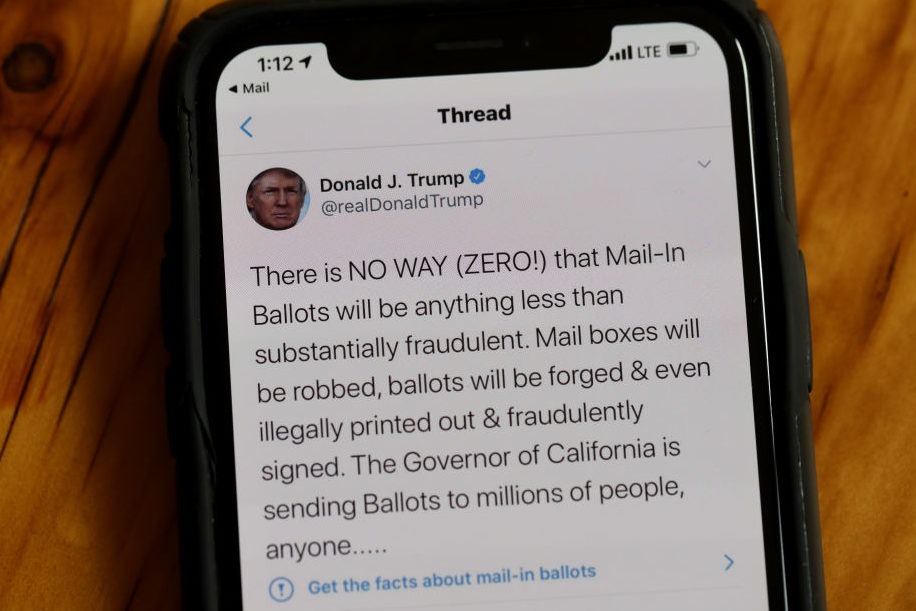Twitter began ‘fact-checking’ President Trump’s tweets for the first time last week, raising questions about the role that social media giants play as gatekeepers of digital information.
After the President asserted that mail-in ballots would be ‘substantially fraudulent’, a blue notification was placed at the bottom of the original tweet: ‘Get the facts about mail-in ballots’. The notification links to a fact-checking page with the heading ‘Trump makes unsubstantiated claim that mail-in ballots will lead to voter fraud’.
If Twitter provides links to third-party sources in response to users’ posts — or if it provides its own first-party information — should it be considered a ‘platform’ for users, or is it now operating as a ‘publisher’ of information? This distinction matters in the context of Section 230 of the 1996 Communications Decency Act. The statute provides legal protection for providers of an internet service — such as Twitter — from any content posted by its users that could be deemed indecent or offensive.
According to the Electronic Frontier Foundation, this statute creates a framework that allows largely unmitigated free speech on the internet. Section 230 gives websites the ability to host content without concern over liability for its users’ actions, such as giving license for YouTube users to freely upload their own custom videos and Amazon customers to provide unfiltered reviews. Section 230 has a handful of important exceptions, such as facilitation of sex trafficking.
The Communications Decency Act was an early attempt by Congress to restrict pornography on the internet. It resulted in the landmark 1997 Supreme Court case Reno v. American Civil Liberties Union, in which the Court unanimously ruled that the anti-indecency provisions of the Communications Decency Act violated the First Amendment.
Currently, Twitter considers itself a ‘platform’ under Section 230, thereby claiming that it should be immune to liability for its users’ content. As the office of Rep. Matt Gaetz of Florida explains, Twitter is ‘immune to being sued’ for what people post. ‘You can’t sue Twitter if you see a tweet you don’t like.’
However, President Trump is seeking to restrict Twitter’s immunity in response to their fact-check; the President recently signed an executive order to this end.
Several leading members of Congress are following suit. On his podcast, Rep. Gaetz said that he will be working on legislation to amend Section 230 alongside other members of the House Judiciary Committee: ‘Should a digital platform that…has some discriminatory effect on content that is posted…get liability protections that are not provided others?’
Rep. Gaetz’s office says the answer is an unequivocal ‘no’. Under the new legislation, Section 230 immunity would be ‘contingent on not offering editorial judgments’, such as ‘“fact checking” content that users (Donald Trump) post’. Gaetz’s office argues that this editorial judgment should cause Twitter to be a publisher, not a platform, especially since Twitter utilized the phrase ‘get the facts’ in their fact-check.
Other members of the House Judiciary Committee agree. Rep. Andy Biggs of Arizona explains that at their beginning digital platforms functioned as public squares in which users could practice their First Amendment rights freely. Now, however, ‘these same platforms are acting like thought-police, filtering political ideology, flagging posts they deem questionable, and promoting the news, sources and information they deem worthy.’
Rep. Biggs says that Congress must revise the protections that social media giants receive under Section 230: ‘It is time we hold these platforms-turned-publishers accountable for their actions; they are not entitled any longer to the protective exclusions given to platforms.’
Rep. Greg Steube of Florida says that Twitter effectively decided to re-classify themselves as a publisher, thereby accepting liability for its users’ content. He found it particularly concerning to see ‘the pilot of this initiative used on statements from the President of the United States, especially as it falls on the coattails of past reports of shadow-banning and censoring conservative content at higher rates than liberal content’. Simply put, Rep. Steube asserts that ‘selective fact-checking on a partisan basis should not be protected.’
Citing Twitter’s fact-checking of President Trump, as well as YouTube’s deletion of comments deemed offensive to the Chinese Communist party, Rep. Guy Reschenthaler of Pennsylvania said that ‘Twitter has shown its willingness to abuse its power by putting weight on the scales of a fair election that favors its elitist, liberal bias.’ He believes that the President ‘is absolutely right to investigate whether big tech companies like Google and Twitter deserve continued legal protections.’
Additionally, Sen Josh Hawley of Missouri sent a letter to Twitter CEO Jack Dorsey last Wednesday. The letter posed several questions about Twitter’s bias in fact-checking President Trump, then asked for an explanation on ‘why you think that companies that act like publishers should not be treated like publishers’.
[special_offer]
While legislators seem to be working under the presupposition that Section 230 immunities ought to be revoked if Twitter conducts virtually any commentary or fact-checking on users’ content, Prof Eric Goldman of Santa Clara University School of Law is operating under a slightly more nuanced premise. According to Goldman, Twitter’s fact-checking ‘does not undermine or jeopardize its eligibility for Section 230 immunity at all’. While Twitter would not receive Section 230 immunity for first-party content, ‘any third-party content that Twitter promotes or links to would still be covered by Section 230.’
In other words, Twitter is not protected for content that it produces, such as its one-liner below the President’s tweet that said ‘get the facts’. However, under Section 230, Twitter can take content — say, for example, from the New York Times — and link to it underneath a user’s post.
Officials in the White House and on the Hill are clearly gearing up for an extended battle over political bias against conservatives, the relationship between big tech giants and free speech and the role of social media in public discourse. Trump’s executive order and other forthcoming measures will likely face a fair deal of challenges in the courts, but this conversation will set important precedents for digital free speech in the 21st century.


















